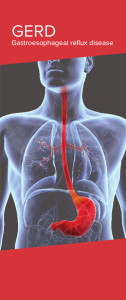GERD (Reflux / Acid Reflux)
As explained in the Heartburn section of this site, gastroesophageal reflux disease (GERD), also referred to as acid reflux or reflux occurs when stomach contents flows back up through the lower esophagus sphincter (LES) into the esophagus — the muscular tube that carries food and liquids from the mouth to the stomach. The irritation and burning sensation felt by individuals experiencing reflux is what is more commonly known as heartburn or sometimes indigestion as it is typically coupled with the taste of food / liquids recently ingested or an acid / bitter taste.
Occasional reflux is not uncommon, however, if heartburn persists, is more chronic or long lasting than a few minutes to hours and occurs a couple times per week for a few weeks, this could be a sign of gastroesophageal reflux disease or GERD.
GERD if left unchecked, can lead to more severe medical issues. If one has persistent, chronic heartburn that occurs more than twice a week and last for a number of weeks, should contact their healthcare provider or the Heartburn Center of California to schedule an appointment to be evaluated by a specialist.
GERD occurs when the lower esophageal sphincter (LES) becomes weak and allows stomach contents to rise into the esophagus. Normally, the LES allows food and liquids that are swallowed to enter the stomach via the esophagus, but stop stomach contents from rising into the esophagus.
Symptoms of GERD:
- Frequent and / or persistent heartburn
- Chest pain (If this is accompanied by shortness of breath, arm or jaw pain, contact 911 immediately, these might be signs of a heart attack.)
- Dysphagia (i.e. difficulty swallowing)
- Globus sensation (i.e. feeling like there is food at the back of the throat)
- Hoarseness or soar throat
- Persistent bad breath
- Dental erosion / cavities
Contributors to GERD:
- Hiatal Hernia
- Paraesophageal hernia
- Obesity
- History of pregnancy
- Heavy weightlifting
- First or second hand smoke
- Some painkillers, calcium channel blockers, antihistamines, antidepressants, to name a few.
GERD is not only isolated in adults, but may occur at any age.
Potential Complications from GERD:
- Esophagitis – inflammation of the esophagus that damage esophageal tissue (the esophagus is the tube that carries nutrients from the mouth to the stomach)
- Esophageal stricture / scarring – narrowing of the esophagus, causing difficulty in swallowing
- Asthma – a condition resulting in the narrowing of the airways, leading to wheezing, shortness of breath, tightness of the chest and coughing. 80% of adult asthma can be linked to GERD
- Barrett’s esophagus – abnormal change in the cells of the lower esophagus which can lead to esophageal adenocarcinoma or esophageal cancer
- Recurrent pneumonia – defined as 2 or more cases of pneumonia in an 18 month period
- Pulmonary fibrosis – may be referred to as scarring of the lung. The development of stiff, thickened tissue in the lungs that impairs the normal their normal uses.
- Esophageal cancer– esophageal cancer emanating from cells that release mucus or other fluids. This form of cancer is the fastest form of cancer in the United States with some estimates having the growth at 600% from 1973 to 2006 [1]
To download an informational pamphlet on GERD click here:
(1 MB)
[1] Pohl, et al., Esophageal adenocarcinoma incidence: are we reaching the peak? Cancer Epidemiol Biomarkers Prev 2010;19:1468-1470. Published OnlineFirst May 25, 2010

